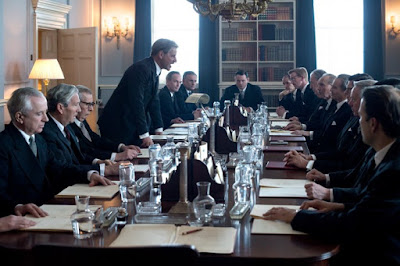 |
| An end to "business as usual"? (Anthony Eden and his cabinet in The Crown (Netflix)) |
I wonder if it has occurred to other people watching "The Crown" -- as it has occurred to me -- that the tailspin into which the UK was thrown by the Suez Crisis might be compared to what is happening to the US in the course of the crisis over North Korea and nuclear weapons.
(See "The Crown: What was the Suez Crisis and why did it bring down Prime Minister Anthony Eden?")
Today I am sitting down to study the chronology of developments during the past year. But even before beginning, I'm aware of similarities:
* Before the Suez Crisis, it was just assumed that it was for the UK to decide the disposition of the canal. It never occurred to anyone that that particular piece of infrastructure might be controlled . . . by Egyptians!
* Before the Suez Crisis, it was just assumed that the UK could brandish its military might, and its allies would applaud it. UK leaders didn't expect the rest of the world to say, "What gives you the right?"
* Before the Suez Crisis, UK leaders (like Anthony Eden) never thought of leaders of other countries (like Gamal Abdel Nasser) as being entitled to stand up to them. That changed . . . .
The slow-boil crisis over North Korea and nuclear weapons is changing assumptions about how the US acts, and where it stands in relation to the other nations in the world.* Before the Suez Crisis, it was just assumed that the UK could brandish its military might, and its allies would applaud it. UK leaders didn't expect the rest of the world to say, "What gives you the right?"
* Before the Suez Crisis, UK leaders (like Anthony Eden) never thought of leaders of other countries (like Gamal Abdel Nasser) as being entitled to stand up to them. That changed . . . .
As of today, there are 73 House members and 13 senators calling for restrictions on the ability of the US president to unilaterally call a nuclear first strike:
Co-sponsors of HR.669 "Restricting First Use of Nuclear Weapons Act of 2017" (introduced by Rep. Ted Lieu)
Co-sponsors of S.200 "Restricting First Use of Nuclear Weapons Act of 2017" (introduced by Sen. Ed Markey)
AND . . . the UN treaty on a global nuclear weapons ban has been signed by 56 countries and ratified by 3 already: "Signature/ratification status of the Treaty on the Prohibition of Nuclear Weapons."Co-sponsors of S.200 "Restricting First Use of Nuclear Weapons Act of 2017" (introduced by Sen. Ed Markey)
So I am beginning to wonder:
* Is the issue any longer: "How will the US control North Korea?"
* Perhaps the issue has become: "How has North Korea managed to change the position of the US in the world?"
* Perhaps the issue has become: "How has North Korea managed to change the position of the US in the world?"
Some of my previous posts on this topic:
Who Has Been "Begging for War"?
Korea: A History of Living Under Nuclear Terror
North Korea and #NuclearBan
Please share this post . . . .























 In 2016, I wrote a lot about nuclear disarmament and the global peace movement, church life and social justice, and trying to understand this diverse society we live in.
In 2016, I wrote a lot about nuclear disarmament and the global peace movement, church life and social justice, and trying to understand this diverse society we live in.













 In his confirmation hearings for attorney general, Trump-appointee Senator Jeff Sessions will be asked to define the word "race." The nation will be listening . . . .
In his confirmation hearings for attorney general, Trump-appointee Senator Jeff Sessions will be asked to define the word "race." The nation will be listening . . . .




 The rest of the world is committed to abolishing nuclear weapons in 2017. US, Russia -- Trump, Putin -- your move . . . .
The rest of the world is committed to abolishing nuclear weapons in 2017. US, Russia -- Trump, Putin -- your move . . . . 



